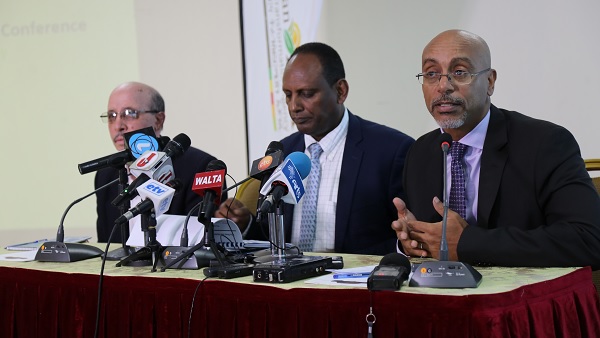
More emphasis will be given to establishing a system that would help scale up the Direct Seed Marketing and efforts to further increase accessibility of products
ADDIS ABABA (ATA)–The Agricultural Transformation Agency (ATA) held a press conference to showcase the successes of the Direct Seed Marketing (DSM) project, which it implements in collaboration with the Ministry of Agriculture and Livestock Resources (MoALR) and Regional Bureaus.
The press conference was held on 9 August 2018 in Addis Ababa, during which it was stated that over 370,000 quintals of seeds were supplied for sale in 228 woredas in the four regional states in 2017/18. The system has also saved more than one billion ETB that the regional governments would have used for seed distribution in the conventional system.
The event was kicked off by remarks from ATA’s CEO, Ato Khalid Bomba, who said the goal of DSM is to set up a robust seed marketing system that creates the market environment and incentives for seed producers to deliver seed effectively through multiple channels. He also added that, since the inception of the project, public and private seed multipliers have been doing a better job in supplying quality seed to farmer on time and at competitive prices.
Dr. Eyasu Abraha, State Minister for MoALR said that efforts are being invigorated to establish a seed marketing system that enhances productivity. He added that emphasis will be given to establishing a system that would help scale up DSM and efforts to further increase accessibility of products.
Following the opening remarks, a presentations on the performance and impact of DSM was given by the Director for Inputs and Crop Protection at ATA, Dr. Yitbarek Semeane. DSM makes it possible for seed producers to sell seed directly to farmers through their own marketing agents, addressing the critical challenges of the public seed allocation and distribution system.
The event was attended by invited guests and media, while representatives of from regional bureaus of agriculture and livestock resources, marketing agents and farmers provided the basics of regional DSM implementation and the impact it has made on their lives.
Source: ATA
